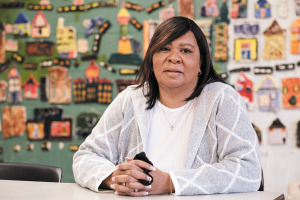Holcomb names Indiana Rep. Holli Sullivan as secretary of state
Sullivan will replace outgoing Secretary of State Connie Lawson, who announced in February that she would be retiring after 32 years in public service.
Sullivan will replace outgoing Secretary of State Connie Lawson, who announced in February that she would be retiring after 32 years in public service.
Trish Whitcomb’s exit leaves Mike Schmuhl, former presidential campaign manager for Pete Buttigieg, and Tom Wallace as the two remaining candidates for chair of the Indiana Democratic Party.

Gov. Eric Holcomb is not having much luck getting what he wants from the General Assembly this year, even though both chambers are overwhelmingly dominated by his Republican Party.
Sampson Levingston believes we discover who we are through discovering where we are. That’s why he started offering Through2Eyes Walk and Talk tours in June—to give people an opportunity to learn more about the history of Indianapolis communities.

During the occasionally tense hearing on House Bill 1123, a slew of officials from Gov. Eric Holcomb’s administration tried to convince lawmakers that the governor’s ability to make quick decisions has been key to the state’s response to the COVID-19 pandemic.
Indiana lawmakers are considering legislation that would freeze property tax assessments for four years when a property owner wins an appeal.

The pandemic changed just about every aspect of Lori Casson’s job as executive director of Dayspring Center.
Indiana Secretary of Commerce Jim Schellinger took some people by surprise earlier this week when he announced he had resigned, but he says his departure is no reason for wild speculation, even if it seems abrupt.
Rod Ratcliff, the former chief executive for Centaur Gaming and Spectacle Entertainment, reached a settlement agreement with the Indiana Gaming Commission that requires him to sell his remaining casino ownership shares.
The governors issued a statement criticizing President Joe Biden’s plan to allocate most of the aid to states based on the unemployment rate, rather than total population. Indiana would receive $881 million more if previous allocation methods were used.

Young, 48, had widely been expected to seek another term and made it official on Twitter on Tuesday morning, saying “more work remains” to be done.

General Assembly has avoided COVID outbreak, but debated the budget and gubernatorial powers as tempers flared over racial issues.
The Indiana Department of Health told IBJ that the state’s COVID-19 testing data, which has been updated daily since the pandemic began almost a year ago, is limited to information on Indiana residents.
Indiana Gov. Eric Holcomb’s executive order outlining pandemic-related capacity restrictions based on a county-by-county system will continue through March, as will the public health emergency.
Republican legislative leaders have generally praised Gov. Erric Holcomb’s handling of the pandemic, but they also say lawmakers should be able to provide input in the decisions when an emergency continues for an extended period of time.

Senate Bill 141 would withhold 10% of local income tax revenue from IndyGo until it meets a private fundraising threshold established in a 2014 law. It also would prevent IndyGo from moving forward with expansion projects, like the Blue and Purple lines, until it secures private funding.
The budget, which takes effect in July, would make a handful of one-time investments in small businesses, regional projects, student learning loss, health initiatives, broadband and police training, and it would significantly increase funding for the private school voucher program.

During the Indiana House session on Thursday, a bill concerning school district boundaries that some are calling racist sparked an emotional and angry debate in and out of the chamber.

Senate Bill 141, authored by Sen. Aaron Freeman, R-Indianapolis, would withhold 10% of local income tax revenue from IndyGo until it meets a private fundraising threshold established in a 2014 law.
House Bill 1309, authored by Rep. Karen Engleman, R-Georgetown, will allow employees to request accommodations from their employer—something pregnant workers are already permitted to do.